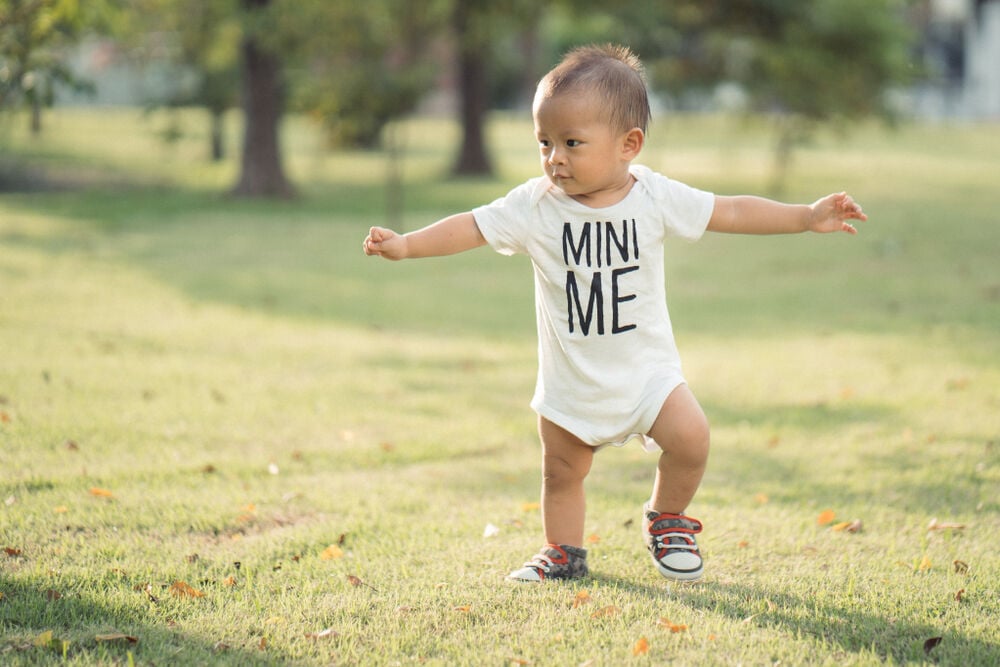For a baby, walking is a milestone in itself, but an early walking baby can be an incredible source of pride for Mom and Dad. Interestingly, a study published in the medical journal Pediatrics found that an early walking baby may be an indicator of success later in life, but it's not necessarily true in every case.
-
Tracking cycle
-
Getting pregnant
-
Pregnancy
-
Help Center
-
Flo for Partners
-
Anonymous Mode
-
Flo app reviews
-
Flo Premium New
-
Secret Chats New
-
Symptom Checker New
-
Your cycle
-
Health 360°
-
Getting pregnant
-
Pregnancy
-
Being a mom
-
LGBTQ+
-
Quizzes
-
Ovulation calculator
-
hCG calculator
-
Pregnancy test calculator
-
Menstrual cycle calculator
-
Period calculator
-
Implantation calculator
-
Pregnancy weeks to months calculator
-
Pregnancy due date calculator
-
IVF and FET due date calculator
-
Due date calculator by ultrasound
-
Medical Affairs
-
Science & Research
-
Pass It On Project New
-
Privacy Portal
-
Press Center
-
Flo Accuracy
-
Careers
-
Contact Us
Are Early Walking Babies the Future Geniuses?


Every piece of content at Flo Health adheres to the highest editorial standards for language, style, and medical accuracy. To learn what we do to deliver the best health and lifestyle insights to you, check out our content review principles.
How early can a baby start walking?
If an early walking baby is enough to keep you up at night, don't worry. It just means they're ready to move and explore the world around them.
Babies can take their first steps anywhere between 9–12 months old and are usually pretty skilled at it by the time they're 14–15 months. Every baby is different, though — remember that babies are very busy developing stronger muscles and coordination during their first year. Before a baby learns to walk, they have to learn to sit, roll over, crawl and finally stand on their own. In addition, proper nutrition and feeding all have a role to play when it comes to muscle development and coordination.
Here are the typical phases babies go through as they learn to walk:
By the time your baby is around 6 months, you can let them bounce up and down while balancing their feet on your thighs as you hold their hands. At this age baby usually sits well unsupported, transfers objects hand to hand (switches hand), rolls prone to supine.
Take a quiz
Find out what you can do with our Health Assistant
Around 9 months (or earlier if you have an early walking baby), they start to pull themselves up on furniture and attempt to stand. If you have a walking baby, they may try to cruise at this stage — that is, use a series of furniture pieces to support themselves while taking a step or two in between.
Toddler trucks and other push toys can help encourage your baby to practice their walking skills as they balance themselves on the toy's handle and push it along. Always make sure to have a soft, safe environment for baby to play in and practice maintaining their balance.
Breastfeeding and early walking babies
Scientists continue to study the relationship between breastfeeding and babies who develop strong motor skills early in life. One study, which took place in New York, attempted to study the relationship between breastfed babies and early walking.
The study found that babies who were fed solids in addition to breast milk at 4 months achieved both standing and walking 7 percent faster than infants who were exclusively breastfed. However, the findings from this study didn't remain significant when corrections and multiple studies were performed, so the link between breastfeeding and early walking babies remains unknown.
Babies walking too early

Early walking babies can be a sign of their growing personalities. It could mean that your child is overeager and potentially impulsive (although, what child isn't?). An earnestness to move on and explore the world around them isn't necessarily a bad thing, but it's definitely a trait to watch out for as they grow.
At the very least, early walking is going to make for a very interesting time for you as they have a hard time sitting still and want to explore every nook and cranny of your house.
Some pediatricians believe babies who walk too early are predisposed to a medical condition called Blount's Disease, which can cause them to become bowlegged. This isn't necessarily true, however, as many other factors can contribute to bowleggedness, including family history. Other pediatricians disagree and call this theory a myth, believing that standing or walking early is of no harm to an infant.
The bottom line is, if they're pulling themselves up to stand and cruising among furniture at an early age, there isn't much you can do to stop them. All you can do is sit back, enjoy and keep them safe as they motor around your living room.
Is baby walking early a sign of intelligence?
Opinions differ on whether your baby walking early is an early indicator of intelligence. There has been a general perception that this is true, but it's not been proven by scientific studies.
Medical studies
The team of researchers that conducted the study published in Pediatrics magazine looked at 599 milestone reports of children born between 2008–2010. Their parents were responsible for recording when their kids reached four significant developmental milestones: sitting up without support, crawling, standing alone and walking without assistance.
The authors of the study ended up finding a link between the age at which the babies first stood on their own and their overall cognitive abilities at age 4.
For example, babies who first stood alone at 9 months had higher test scores at age 4 than those children who didn't stand alone until 11 months.
But just because one study finds a link doesn't mean it's true. The size of the study was small, and findings were a bit different for twins. More research is needed to determine whether or not hitting milestones early is an indicator of intelligence later in life.
Other medical studies have found no relationship between intelligence and a baby walking early.
The Swiss National Science Foundation performed a study in 2013 to try to find a relationship between early walking and intelligence, but they found no correlation between the two.
It's generally believed that the actual level of intelligence of a child is more closely related to genetics and environmental factors. This includes things like parenting styles, education, availability of learning tools and even nutrition.
So if your child is an early walker, does this mean they're a bona fide baby genius? No, not necessarily. But what it does mean is you can take pride in one of the biggest accomplishments of their lives and look forward to the many more achievements they'll make during their lifetime. It also makes for a great baby book entry.


Hey, I'm Anique
I started using Flo app to track my period and ovulation because we wanted to have a baby.


The Flo app helped me learn about my body and spot ovulation signs during our conception journey.


I vividly
remember the day
that we switched
Flo into
Pregnancy Mode — it was
such a special
moment.
Real stories, real results
Learn how the Flo app became an amazing cheerleader for us on our conception journey.




